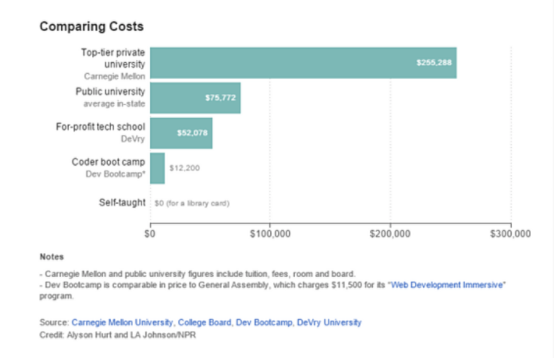Explore App Academy's in-person software engineering program, with campuses in New York City & San Francisco, designed to equip students with the necessary skills for a successful career in the tech industry.
Do you want to work in tech?
Do you want to work in tech and join the most respected coding bootcamp in the industry?
Enter App Academy’s Campus-based Software Engineering Programs: In the first 4 weeks, you’ll have a foundational knowledge of key programming languages and in the remaining 12 weeks, you’ll not only have a strong grasp of full-stack software engineering, but you’ll have built a multi-app portfolio to boot.
The best part is you don’t have to pay any tuition until you graduate and land a job. We believe everyone deserves access to education in the fastest growing (and most lucrative) job market in the world: Software Engineering. Coding bootcamps — App Academy in particular — have as strong, if not stronger outcomes than other kinds of education (such as Bachelors or Masters programs) and boast the most immediate path to a new career.
Put simply, there is more opportunity for folks who can code and create dynamic, user-friendly apps and webpages than any other trade in history. App Academy’s Campus-based Software Engineering Programs take you from no experience to being competitive in the tech job market in just four months.
Yes, four months. We’ve got the alumni to prove it.
Let’s dive deeper into everything this program has to offer and what you can expect coming out of it.
Campuses are reopening in January 2022
After thoughtful consideration, our Campus-based Software Engineering Programs (NY: Full-Time Software Engineering Track, CA: Full-Time Software Engineering Program) will be resuming in person learning for our San Francisco and New York students. Please note that this program offers a Hybrid schedule in SF and an In-Person schedule in New York.
While San Francisco and New York top the list of tech scenes in the U.S. right now, it’s important to note that the tech industry is growing everywhere, both domestically and abroad, which is why we’re so excited to now offer this course to students everywhere. Plus, the opportunities that come with having software engineering experience go way beyond working for traditional tech organizations: Media, fashion, retail, education and healthcare companies all have a need for software engineers as our world becomes increasingly tech-forward.

Source: https://www.statista.com/statistics/793624/worldwide-developer-survey-industry-employment/
The program runs Monday through Friday, 9am – 6pm in your respective time zone (EST for New York, PST for San Francisco). Find the next available course dates here.
There are plenty of cities worldwide that are burgeoning tech communities, so why have we chosen New York and San Francisco to offer our program? Let’s break down the opportunities these two cities provide our alumni:
New York.
Finance, fashion, and food have always dominated the New York job scene, so it’s hard to imagine this cultural hub transitioning into the tech market. Over the last decade, though, frequent venture capitalist activity has created more than just flash-in-the-pan app startups. New York is truly becoming a home to technology that could one day rival Silicon Valley.
New York is third only to California and Texas for jobs in the tech sector. Plus, with notable companies like Peloton, Spotify, Salesforce, and WeWork all calling the Big Apple home, there’s opportunity aplenty for new engineers to make an impact.

Source: https://www.nytimes.com/2019/02/22/technology/nyc-tech-startups.html
San Francisco.
Near the top of proverbial Silicon Valley is San Francisco, a city with storied history and even more storied microclimates. The tech scene was born here, so it makes sense to lay down roots in San Francisco as our west coast hub.
Facebook, Apple, Google, Pinterest, Twitter, Intel, HP, and Airbnb all call the Bay Area home, among others, so there are a ton of opportunities for fresh coding talent.

Program tuition and payment options
If you’re considering a coding bootcamp, it’s worth noting the differences in cost versus a more formal education, whether that’s at a four-year university or an accredited technical school.

Source: https://www.lifehacker.com.au/2015/04/will-a-programming-boot-camp-help-me-get-a-coding-job/
Unlike traditional education, App Academy charges no tuition until you’re hired. If you’re not successful, we’re not either. What’s important to note here is that this tuition model allows our goals and incentives to align with yours. The curriculum we provide, the support we offer you before, during, and after the course, the partnerships we make with top companies — these are all in the interest of helping you take the next step in your career.
When tuition is uncoupled from outcomes, it creates a misalignment of incentives. Many coding bootcamps or universities accept students knowing that it will be difficult to train them successfully. These students often have a tough time during their education and an even more difficult time finding a job afterwards, yet they are still charged tuition by the program. This is the opposite of what we strive to do at App Academy.
Taking an immersive programming course is a big decision for any student and by sharing risk with you, App Academy ensures that it won’t take your commitment for granted. Students know that App Academy will go the extra mile to make sure they succeed.
Consider, too, that after you land your first job, your earnings over time will significantly increase. Not only do folks note making a net gain in their first year of employment, most also see significant salary increases and promotions in their roles within three years because there’s so much upward mobility in the software engineering industry. Unlike traditional education that sees most of its students paying off debt for decades, you actually make money going through the 16-week immersive program within one year.
We want you to succeed. There are too many barriers in place to gaining useful, quality education that could launch you into a new career! These are the tuition plans and the options available for paying them:
Deferred Plan: Pay an upfront refundable deposit of $3,000 (this is to make sure you show up to class and have some skin in the game to work hard during the program), then pay $25,000 once you are hired post-graduation. Your deposit is rolled into your full tuition amount once you begin working or will be returned to you if you do not find a job per the program’s job search agreement.
To be eligible for this plan, you must be 20 years or older or have a college degree if under 20. You also must be a U.S. citizen or permanent resident.
Upfront Plan: Pay $17,000 for the program upfront or finance the course monthly through Climb. To be eligible for this plan, you must be 18 years or older and have a high school diploma (or equivalent). You do not need to be a U.S. citizen or permanent resident.
Hybrid Plan: Pay $9,000 for the program upfront, then pay $14,000 once you are hired post-graduation.
Applicable skills you’ll learn in the 16-week course
Not only will you learn the fundamentals of the industry’s most sought after coding skills, you’ll use them to create stunning portfolio pieces.
So how will our team of seasoned engineering instructors help create the engineers of the future? Think interactive lesson plans, hands-on curriculum, and regular mentorship from teachers and classmates. Our curriculum gets updated regularly, too, to include relevant topics, examples, and technologies. The job market heavily dictates what we teach in the classroom, so we adapt teaching methods, lesson plans, and coursework based on what is most likely to land our students their dream job.
From front-end to back-end, 16-week course covers everything you’ll need to know to kickstart a new, successful career as a software developer. Let’s dive a little deeper into the hard skills you’ll pick up during the course and why we teach them:
Ruby on Rails.
Ruby is a standard programming language that developers and engineers use to build apps and websites. Folks tend to enjoy how simple and “natural” it feels to write this code.
Rails refers to the web application development framework that is written in Ruby code. According to experts, “it is designed to make programming web applications easier by making assumptions about what every developer needs to get started.” With Ruby on Rails, you’re typically writing less code, so a lot of experienced developers actually find it pretty enjoyable to work with.
You’re probably familiar with some Ruby on Rails apps: Airbnb, Soundcloud, Shopify, and Hulu (among many, many others) were all built using this language.
Javascript.
Chances are, you’ve heard of Javascript. It’s been around for years!
Javascript is used to create dynamic web and app content — think anything that moves, changes, or scrolls with your screen like slideshows, autocomplete text, and other interactive elements. It’s sort of the icing on the cake once you’ve built the physical framework out and you’ve designed how you want it to look. Javascript makes everything more fun.
We teach it because it’s a crucial part of the development process. It’s not likely that you’ll be designing a web page or an application that doesn’t have dynamic features to some extent. Google, YouTube, Amazon, eBay and Facebook all use Javascript.
Object-Oriented Programming.
Before you really dive into writing code, understanding different computer programming models can help you learn different execution techniques. Object-oriented programming, or OOP, is one such model that we like teaching because it’s heavily based around data rather than functions or logic.
So what does that mean? Search App Architecture tells us that “OOP focuses on the objects that developers want to manipulate rather than the logic required to manipulate them. This approach to programming is well-suited for programs that are large, complex and actively updated or maintained.” Ruby on Rails and Java are two languages that employ this idea because everything revolves around the objects you’re building.
HTML & CSS.
Before you sprinkle in Javascript elements, you have to build the physical web page first. That’s where HTML & CSS come in.
HTML (hypertext markup language) and CSS (cascading style sheets) are not actually programming languages; rather, they’re the foundation that allows you to implement programming languages.
When you think of “front end” and “back end”, HTML and CSS are true front-end elements. They provide the structure of the web page and the way information is presented on the page (like the layout and the formatting).
Other notable skills.
Learning code and implementing your skills on course projects is just the beginning. These are some other crucial skills you’ll learn during the program that will be helpful when you enter the workforce:
- Version control with Git to record changes to specific files overtime to see how they’ve changed
- Use a database language like SQL to store, manage, and manipulate data within a database management system
- Front-end data management and user interface rendering with skills like React and Redux
- Solve tough problems using abstract methods like recursion
- Prep for interviews and know how to answer frequently asked questions about your experience and your portfolio
Day-to-day life
A combination of lectures, hands-on partner work, and in-depth reviews make up the daily workflow for the in-person program.
Most mornings will begin with a lecture that covers real-world applications, use cases, and helpful information on the topic you’re covering. You’ll break for lunch, then come back and work on a collaborative project with one of your classmates. This is especially important because we want you to get used to working with other developers (and, of course, build strong connections with those who will become your fellow alumni. It’s a great networking opportunity!)
After reviewing your in-class projects and receiving peer feedback, you’ll round out the day by setting yourself up for any homework assignments and getting ready for the following day’s material. Every class gets you one step closer to becoming an accredited programmer.
Graduation and employment
So you’ve completed the course; congrats! But remember, your goal is to get a job, not just an education. We know the journey is just getting started so the moment your coursework is over, you’ll begin working with a dedicated career coach. The relationship is 1:1, so your coach is there to support you and you alone. Career Karma speaks in depth about App Academy’s career coaching process if you’re looking for additional info.
Regardless of where you live or the type of company you want to work for, our focus is to place you in full-time, long-term opportunities, not part-time or internship opportunities.
Whether you’re interested in front end, back end, or full-stack opportunities, they first work directly with you to fine-tune your resume and portfolio. Once you have the foundations in place, your coach then walks you through mock interviews, salary negotiations, and additional project review. You’ll better understand your strengths and areas for improvement and work with your career coach weekly after the program to hone your skills and progress in other skills.
It’s an important distinction to make that our Career Coaches are not recruiters. They’re educators that help you better understand what hiring managers are looking for, but our students are responsible for the heavy lifting in terms of applying to jobs, networking, and being proactive to land their dream career.
App Academy’s best kept secret, though, is our extensive alumni network. The majority of graduates get jobs through the network because we’ve placed students at top companies. As a new alumna, you’ll have direct access to a resource you can’t find anywhere else. Being in the App Academy community creates lifelong value, financially and otherwise.
Other considerations about the Campus-based Software Engineering Programs
Time commitment.
It’s important to us that we set expectations ahead of time, so we want all prospective students to understand that this is a full-time, four month commitment.
Because the class runs Monday-Friday during traditional working hours (9am – 6pm), you won’t be able to hold a job during those hours.
You can expect about 80-100 hours per week of dedicated work time both in the classroom and out. Yes, it sounds like a lot. And it is! But after 16 weeks, you’ll have all of the skills needed to launch a career in web development and software engineering with the portfolio to prove it.
Conclusion
If you’re ready to change your career — and your life — the Campus-based Software Engineering Programs are the quickest and most impactful program for developing new generations of engineers. When you’re ready, apply here. Check out our FAQ for more information about minimum requirements and expectations around campus culture & student experience.
If you aren’t interested or are unable to attend our physical campuses in California or New York and you want to learn about our remote programs (that are open to all U.S. residents and non-citizens, aside from NY), click here.
Don’t just take it from us, though: check out Course Report for honest, unfiltered reviews of our programs, teaching staff, and job placement capabilities.
Don’t miss a beat with The Cohort!
We’ll send you the latest Tech industry news, SWE career tips and student stories each month.













